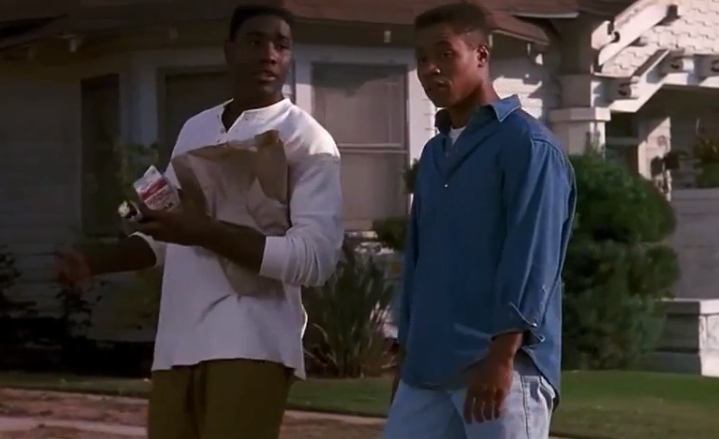 When moviegoers talk about Fruitvale Station, which pulled in nearly $4.7 million over last weekend’s nationwide release, they often talk about the sobbing that you hear in the theater as the credits roll, especially noticeable because the tears flow openly from the men in the audience.
When moviegoers talk about Fruitvale Station, which pulled in nearly $4.7 million over last weekend’s nationwide release, they often talk about the sobbing that you hear in the theater as the credits roll, especially noticeable because the tears flow openly from the men in the audience.
This phenomenon was first noted at opening weekend in Oakland, where audiences watching the story of Oscar Grant, an unarmed young black man shot to death, emerged from theaters to hear that George Zimmerman was found not guilty of the murder of Trayvon Martin. Tweets about the verdict twinned the hashtags #oscargrant and #trayvonmartin as the same story, different state.
The timing of the movie’s release is more than a little eerie, and when director Ryan Coogler discusses it, he is cautious, saying he didn’t anticipate the two would become linked. “People draw a lot of parallels between what happened with Oscar and Trayvon,” he told me as he prepared for a screening in Atlanta. “For me, the film is about humanity and it’s about relationships, and the relationships left behind when a human being’s life is cut short.”
It seems inevitable that Fruitvale Station will benefit from the publicity, first of the verdict in the Zimmerman case, and then of President Obama’s surprise remarks about the history of anti-black racism in America. Coogler has been widely lauded by critics for his humanizing portrait of Oscar Grant — as a doting father, a not-quite-reformed weed dealer, a recently unemployed young adult, and a tender son. A less hailed, but just as significant, feature of the movie is its representation of the San Francisco Bay Area’s racial dynamics. Audiences see Grant interact fluidly with people of diverse ethnicities, both in casual exchanges and in deeper relationships of the sort that are the norm in this demographically anomalous region, where even racial animus doesn’t always conform to the black-white binary so common elsewhere in the country. Coogler said that’s simply a reflection of Grant’s life.
“He had friends that were Hispanic, Indian, Filipino…that’s kind of how it goes in the Bay in many ways. It’s not a racial utopia…issues of race come up, as they did that night (Grant was killed), obviously. At the same time, (Grant) was a product of his environment, he came from a very diverse environment,” he said.
When I asked the director about other nuanced depictions of black men that he drew on as he wrote the movie, Coogler said he was mostly inspired by real people. But he did offer one reference point that sheds light not only on the state of black cinema, but on racial understanding in America: John Singleton’s Boyz n the Hood.
When the movie came out in 1991, it was controversial and groundbreaking — an insider’s perspective on the perils and beauty of life in the ‘hood, and the hazards of being young, black and male in America. And like Fruitvale Station, the conditions that the story brought to light were also reflected in a contemporaneous bit of citizen journalism: the video that showed Rodney King being beaten by the LAPD was also seen by national audiences that year, and in 1992, South Central Los Angeles erupted in protest.
For many non-black audiences, news stories like these, or racially polarizing characters on reality TV, are what shape their perceptions of young black males. And it’s rare that Hollywood films present counter-narratives to those villified depictions, pointed out Darnell Hunt, Director of UCLA’s Ralph J. Bunche Center for African American Studies.
“Every once in awhile you have these exceptions to the rule, like Fruitvale Station or even Boyz n the Hood, which unfortunately spawned a series of copycat films that weren’t as community oriented as Boyz n the Hood was,” he said. “But the industry is not exactly chomping at the bit to make these kinds of films…about the inner thoughts and feelings of members of the black community.”
This is why Fruitvale Station is ripe with potential for the prospects of indie and young black filmmakers. The film is rolling out in theaters across an illusorily post-racial America, which in many areas is re-segregating, or experiencing deep economic inequality. Two decades after Boyz n the Hood, here’s a movie by a young black director, taken up by Hollywood, that feels a bit like a cinematic handbook for stories that the country needs to see, as the notion of an ongoing “national conversation” about racial dynamics and equity has resurfaced.
For Coogler, the Travyon Martin killing resonated long before the verdict came down this month, and pushed to address it, he responds with a measure of equanimity and reserve.
“Hearing about what happened to Trayvon was a tragedy in February 2012. We were already working on the film then. When the news came on, I was just thinking about how often African American young males die in the streets every day,” he said. “In Oscar’s situation it was a police officer that shot him. In Trayvon’s situation, it wasn’t even a cop. We killin’ ourselves, as well.”
Fruitvale Station sold out in all seven cities where it premiered on the weekend of the verdict. If it continues to do well, after racking up respectable sales in the 1,064 theaters it hit last weekend, it could fuel Hollywood’s appetite for more thoughtful stories that don’t shy away from raw wounds.
The Weinstein company, which nabbed the film at Sundance, has described the film as being in the “public zeitgeist,” a distinction it will no doubt try to ride into Oscar season.


